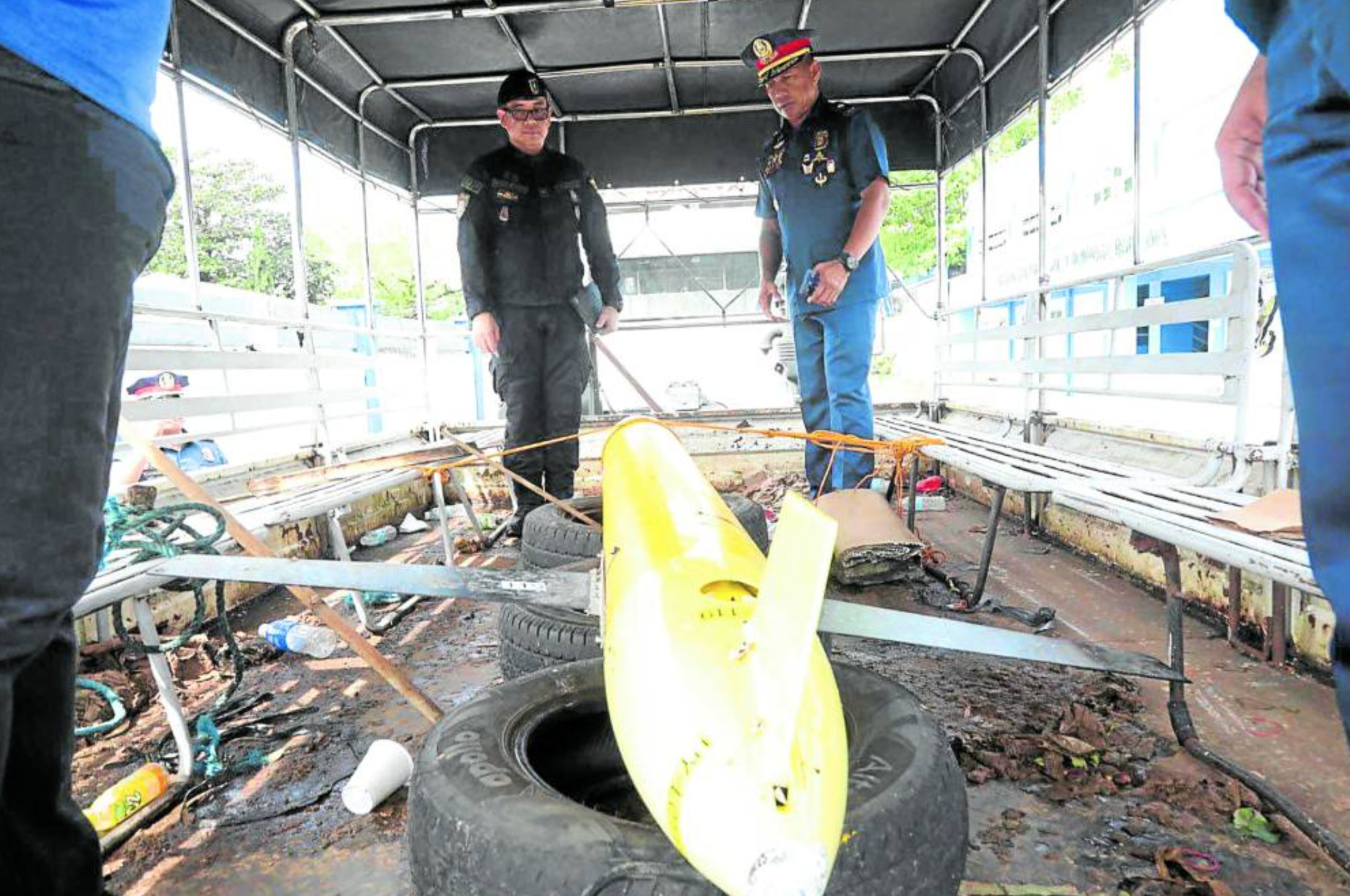‘Chinese’ drone retrieved from Masbate waters piques Navy

WHO SENT IT HERE? AND WHY? Brig. Gen. Andre Dizon, Bicol police chief, inspects the submersible drone recovered by fishermen in San Pascual town, Masbate province, on New Year’s Day. The drone was later turned over to the Philippine Navy unit in southern Luzon. —Photo courtesy of Bicol Police Regional Office
MANILA, Philippines — The Philippine Navy is investigating the origin and purpose of an underwater drone with Chinese markings that was recovered in the waters off San Pascual in Masbate province on Monday.
Col. Xerxes Trinidad, chief of the Armed Forces of the Philippines public affairs office, said on Thursday the police had turned over the remotely operated submersible drone to the military for further investigation.
READ: West PH Sea: Philippines recovers suspected Chinese submarine drone
Three fishermen discovered the drone on Monday morning some nine kilometers off the coast of Iniwaran village, San Pascual town in Masbate province, the Police Regional Office Region 5 (PRO 5) said. The torpedo-shaped drone, spotted floating at sea, bore the markings “HY-119” and was described as about two meters (six feet) long and equipped with fins, an antenna, and a visual lens.
“Based on our open-source research on the internet … HY-119 refers to a Chinese underwater navigation and communication system,” said Bicol regional police director Brig. Gen. Andre Dizon.
Dizon added that the drone is designed for monitoring and reconnaissance activities.
While the drone was unarmed, its recovery raised concerns due to its potential use in intelligence, surveillance, target acquisition, and reconnaissance (ISTAR) operations.
“It has an antenna and an eye that can be used for viewing. Based on our research, this can be used for monitoring and reconnaissance,” he added.
‘Significant implications’
The incident comes amid ongoing maritime tensions between the Philippines and China over contested territories in the West Philippine Sea.
According to a source in the intelligence community, who requested anonymity, similar devices have previously been retrieved in nearby waters, including Chinese buoys off Catanduanes.
“These drones are usually used for reconnaissance and surveillance. They’re not part of the AFP inventory,” the officer noted.
PRO 5, for its part, said the recovery of the underwater drone “has significant implications, as it provides insights into advanced underwater technology and naval capabilities. Authorities are closely examining the device as to its origin and to assess its potential impact on national security and maritime operations.”
It has ordered local police units to coordinate with fisherfolk and communities in coastal areas to report any sightings of similar objects and advised them “not to touch or move the object.”
Colonel Trinidad hailed the collaboration of local fishermen and maritime stakeholders in the recovery of the drone.
He added that the AFP was “fully committed to ensuring the safety and security of our maritime domain, with all necessary resources mobilized to address similar and other situations with the utmost diligence.”
Meanwhile, microbial oceanographer Deo Florence Onda, associate professor at the University of the Philippines Diliman-Marine Science Institute, said it would be difficult to tell whether a particular drone was used for military surveillance or research until “the type of data it had collected (had been) accessed.”
“Both objectives (ocean research and surveillance) may use the same technologies,” Onda said.
Chinese vessels
In recent years, Chinese research vessels had been spotted on the eastern side of the Philippines, including waters near the resource-rich Philippine (formerly Benham) Rise.
In April 2024, a Chinese-flagged research vessel was seen within the vicinity northeast of Viga in Catanduanes province.
In October that same year, two Chinese fishing boats were also spotted off the coast of Casiguran town in Aurora province.
Chinese ships have continued to swarm various parts of the West Philippine Sea (WPS), waters within Manila’s 370-km exclusive economic zone.
‘Monster’ returns
On Thursday, US maritime expert Ray Powell said the massive China Guard Coast ship also known as “The Monster” arrived at Panatag (Scarborough) Shoal on Jan. 1, joining China Coast Guard ships 3106, 3302 and 3305.
Powell, who is the director of SeaLight, a program of Stanford University’s Gordian Knot Center for National Security Innovation that tracks Chinese activities in the WPS, said at least seven Chinese maritime militia ships were also at Panatag.
But Rear Adm. Roy Vincent Trinidad, the Philippine Navy spokesperson for the WPS, said no such activity was monitored at the shoal.
Beijing has controlled the resource-rich shoal following a two-month standoff with the Philippine Navy in 2012.